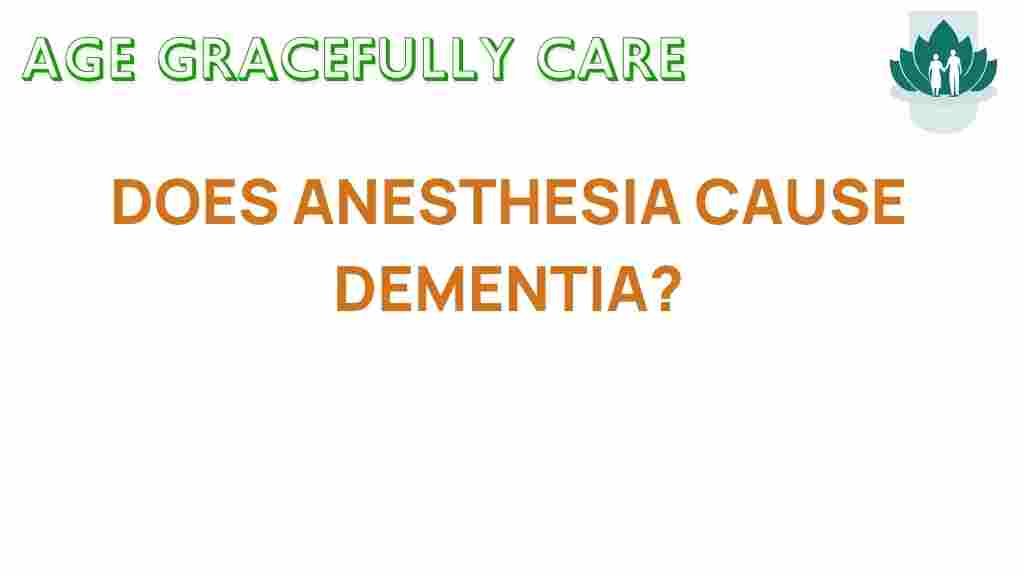Unraveling the Mystery: Does Anesthesia Cause Dementia?
Anesthesia is a critical component of modern surgery, allowing patients to undergo procedures without the pain and discomfort associated with invasive techniques. However, recent discussions have emerged regarding a potential link between anesthesia and dementia. This article aims to explore the relationship between anesthesia and cognitive decline, shedding light on the nuances of memory loss, brain health, and the findings from ongoing medical research.
Understanding Anesthesia
Anesthesia is classified into three main types: general, regional, and local. Each plays a specific role in managing pain and consciousness during surgery:
- General Anesthesia: This type renders a patient completely unconscious and unable to feel pain during the procedure.
- Regional Anesthesia: This involves numbing a specific area of the body, allowing the patient to remain awake but pain-free.
- Local Anesthesia: This is used for minor procedures, numbing only a small area while the patient remains fully conscious.
The Connection Between Anesthesia and Dementia
The relationship between anesthesia and dementia has become a topic of interest in the medical community. Some studies suggest that certain types of anesthesia may contribute to cognitive decline after surgery, particularly in older adults. This phenomenon is often referred to as postoperative cognitive dysfunction (POCD).
Postoperative Cognitive Dysfunction (POCD)
POCD is characterized by a decline in cognitive function that occurs after surgery. Symptoms may include:
- Memory loss
- Difficulties with attention and concentration
- Confusion or disorientation
- Changes in behavior
Research indicates that POCD can occur in up to 50% of older patients after surgery, particularly those who undergo major procedures involving general anesthesia.
Factors Influencing the Risk of Cognitive Decline
Several risk factors may contribute to the development of cognitive decline following anesthesia:
- Age: Older adults are at a greater risk for POCD and long-term cognitive decline.
- Pre-existing Cognitive Impairment: Patients with mild cognitive impairment (MCI) before surgery may experience worsened cognitive function afterward.
- Type of Surgery: Major surgeries, especially those involving significant blood loss or prolonged anesthesia, can increase the risk.
- Duration of Anesthesia: Longer exposure to anesthetic agents may be linked to higher rates of cognitive decline.
- Postoperative Complications: Factors such as infections or delirium following surgery can exacerbate cognitive issues.
Medical Research Insights
Ongoing medical research continues to explore the potential link between anesthesia and dementia. Some key findings include:
- Animal Studies: Research involving animal models has shown that exposure to certain anesthetic agents can lead to increased levels of markers associated with neuroinflammation and cognitive impairment.
- Human Studies: Some longitudinal studies suggest an association between anesthesia exposure in older adults and an increased risk of developing dementia, although results are not universally accepted.
- Neurotoxicity: Certain anesthetics may have neurotoxic effects, particularly in vulnerable populations, such as the elderly.
It is essential to note that while these studies provide valuable insights, more research is needed to establish a definitive causal relationship between anesthesia and dementia.
Preventive Measures for Maintaining Brain Health
While the potential risks associated with anesthesia are concerning, there are several strategies that patients and healthcare providers can implement to maintain brain health and minimize cognitive decline:
- Preoperative Assessment: A comprehensive evaluation of cognitive function before surgery can help identify at-risk individuals.
- Minimize Anesthesia Duration: Whenever possible, choose surgical options that require shorter anesthesia times.
- Postoperative Care: Adequate monitoring and management of postoperative complications can prevent exacerbation of cognitive issues.
- Engage in Cognitive Activities: Keeping the brain active through puzzles, reading, and social interactions may help maintain cognitive function.
- Healthy Lifestyle Choices: Regular exercise, a balanced diet, and proper management of chronic conditions can support overall brain health.
What to Discuss with Your Surgeon
Before undergoing surgery, it is crucial for patients to engage in open discussions with their surgeons and anesthesiologists about any concerns regarding anesthesia and cognitive decline. Important topics include:
- Your medical history, particularly any previous cognitive issues.
- The type of anesthesia planned for the procedure and its associated risks.
- Strategies to minimize anesthesia exposure.
- Postoperative care plans and monitoring for cognitive changes.
Internal and External Resources
For more information on the relationship between anesthesia and cognitive health, consider exploring resources such as:
- Alzheimer’s Association for insights on dementia and memory loss.
- American Society of Anesthesiologists for guidelines on anesthesia and patient safety.
Conclusion
In conclusion, while there is ongoing research into the effects of anesthesia on brain health and its potential link to dementia, the evidence remains inconclusive. It is important for patients, particularly older adults, to communicate their concerns with healthcare providers and take proactive steps to safeguard their cognitive health. Understanding the risk factors, engaging in preventive measures, and maintaining an open dialogue about anesthesia options can help in making informed decisions regarding surgery.
As we continue to unravel the mystery surrounding anesthesia and cognitive decline, staying informed and vigilant about brain health remains crucial.
This article is in the category Health and created by AgeGracefullyCare Team
